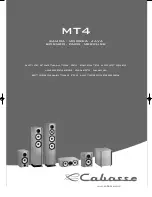
Page 19
Avoiding Hum and Noise
The following guidelines should help you avoid or eliminate hum and noise. These aren’t rules,
and may not apply in all situations, but the more closely you follow the guidelines, the more likely
you are to avoid hum and noise problems. Hum and noise are most often caused by ground issues
such as ground loops, non-optimal cabling or cable placement, or faulty equipment. Hum may
also arise due to how equipment is arranged and connected. If, after following these guidelines,
you still have hum or noise problems, please call Emotiva Technical Support.
Equipment
•
Make sure that all equipment and outlets are properly grounded.
•
Some equipment (especially turntables and phono and microphone preamps) have special
grounding requirements.
•
Some audio equipment (especially vacuum tube equipment) has a high output impedance,
which may render it especially sensitive to hum and noise pickup. If so, it is essential that
signal cables be kept short, of good quality, and not run near power cables.
•
With some older equipment that lacks a grounded power connector, you may experience
more or less hum depending on which way the plug is inserted.
Cables
•
Always use high quality, fully shielded cables.
•
Balanced connections and cables are more resistant to hum and noise than unbalanced
cables.
•
Always ensure that all cables are plugged fully in, that the connectors fit firmly, and that the
cables and connectors are in good condition, with no bent pins or corrosion.
•
Verify that the cables themselves are wired properly according to standards.
(You may encounter custom or modified cables, especially in studios.)
Cable Topology (runs)
•
Always run cables as directly as possible, and use the shortest cables that fit your
requirements. Avoid using excessively long cables and coiling up the excess, especially with
unbalanced connections.
•
If long cable runs are required, then using a balanced connection is more important, and is
strongly suggested.
•
Avoid running signal cables next to power cables. If this is unavoidable, then using balanced
cables is virtually a necessity to avoid hum problems.
•
If you cannot avoid using unbalanced cables in close proximity to power cables, try not to run
them parallel to each other, and try to ensure that, if and when they cross each other, they do
so at right angles.














































